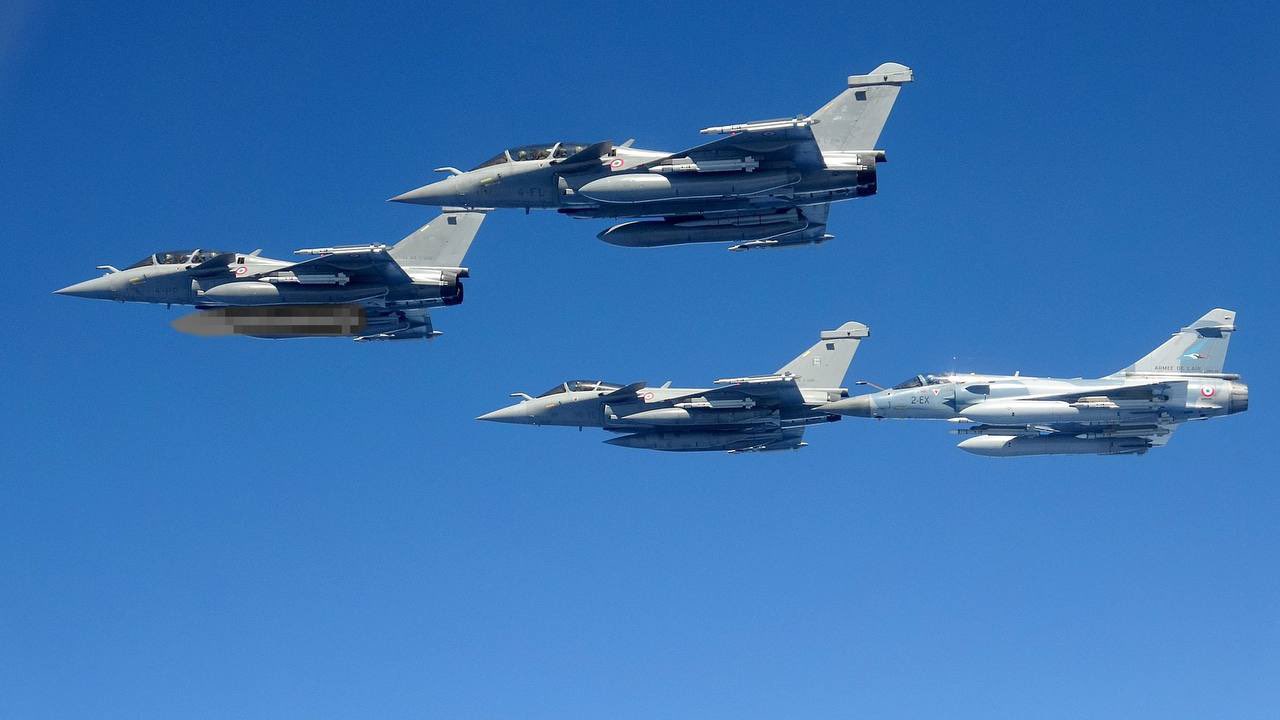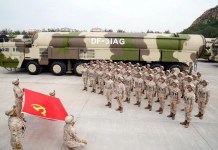France appears to have taken a major leap in its tactical nuclear capability after test-firing an air-launched nuclear missile from a Rafale fighter jet for the first time.
The French Defense Minister Sebastien Lecornu announced that the country fired its modified nuclear-capable missile for the first time on May 22.
Lecornu’s office said, “A French Air Force Rafale aircraft has successfully performed the first test launch of an upgraded supersonic nuclear-capable ASMPA missile without an onboard payload.” The test “specifies the tasks set out in the law on military planning regarding the nuclear deterrent forces.”
The Defense Minister later took to Platform This operation, planned for a long time, realizes the ambition provided for in the military programming law for our nuclear deterrence, of which it demonstrates the excellence and operational credibility.”
The minister congratulated all the forces, ministry teams, and industrial partners involved in the operation.
[#Tir d'évaluation ☢️] #ASMPA rénové
Succès du 1er tir d'évaluation des forces du missile stratégique air-sol moyenne portée amélioré rénové #ASMPA_R
Ce missile sans charge ☢️ a été tiré par un #Rafale des forces aériennes stratégiques lors d'un vol représentatif d'un raid ☢️ pic.twitter.com/rgunuuwjEC
— Direction générale de l'armement 🇫🇷 (@DGA) May 22, 2024
Lecornu specified that the launch was conducted as a part of the Durandal drills that are running from May 13 to June 14. The Minister’s statement mentioned that the French drill aimed to maintain “the credibility of the airborne nuclear element of deterrence” alongside its submarine- launched weapons.
The ASMPA-R missile that was test-fired is what France calls the renovated variant of the ASMPA or the Air-Sol Medium Range (ASMP/ASMP-A), an air-launched land-attack cruise missile equipped with a nuclear payload. The missile is central to the overall French nuclear deterrence.
Opération Durandal : un Rafale des Forces aériennes stratégiques vient de réaliser avec succès le premier tir d’essai en vol d’un missile nucléaire supersonique ASMPA rénové, sans charge embarquée.
Cette opération, prévue de longue date, concrétise l’ambition prévue en loi de… pic.twitter.com/DvEX3h62PV
— Sébastien Lecornu (@SebLecornu) May 22, 2024
According to the missile manufacturer, MBDA, “ASMPA, a supersonic missile carrying a nuclear charge, was initially entered into service on the K3 standard of the Mirage 2000N (until 2018) and now on the Rafale F3R.”
It further added that the “ASMPA-R is the next strategic missile equipping the Strategic Air Forces (FAS) within the Air and Space Force and the Nuclear Naval Air Force (FANu) within the French Navy.
France Although has withheld all information about the ASMPA-R variant, we do know that these missiles have an extended range over their predecessors and a more powerful thermonuclear warhead. These missiles are known as “pre-strategic” weapons in French nuclear strategy. They are the last-ditch “warning shot” before a full-scale deployment of strategic nuclear weapons fired from ballistic missile submarines.
The test comes amid a bullish stance adopted by French President Emmanuel Macron’s administration towards nuclear weapons and overall European security. France plans to allocate about 13% of its future military budget to develop independent nuclear capabilities. That will include upgrading to next-generation air-launched weapons.

While the French Defense Minister said that the mission was planned well in advance, the timing of the test launch is significant. It came a day after Russia kickedstarted its tactical nuclear drills near the Ukraine border. Some netizens and military observers wondered on social media if France was sending a message to Russia. The latter has engaged in a lot of nuclear saber-rattling in recent times.
The Russian drills have been flagged as a warning to the West as there is growing momentum in NATO to send more military support and troops to Ukraine. In March this year, President Vladimir Putin told the West that Moscow was technically ready for nuclear war. If the West sent troops, he said, it would be considered a significant escalation. France was the first country to express willingness to send troops to fight against Russia.
When asked earlier this month if he stood by his remarks, Macron said that he did not rule out the deployment of Western troops that caused a stir around Europe. “I’m not ruling anything out because we are facing someone who is not ruling anything out.”
Russia Launched Nuclear Drills
Russia announced the commencement of tactical nuclear weapons drills in the vicinity of Ukraine on May 21, even as it charged the West, once more, for being “provocative.”
Russia’s defense ministry said : “Southern Military District troops” are practicing combat training tasks of obtaining special ammunition for the Iskander operational-tactical missile system, equipping launch vehicles with them, and covertly advancing to the designated position area in preparation for missile launches.
Russia’s offensive against Ukraine is coordinated from the Southern Military District, which has its headquarters located in Rostov-on-Don, 60 kilometers from the Ukrainian border.
The Kremlin statement read: “Military personnel involved in the exercise practice equipping aviation weapons with special warheads, including the Kinzhal aeroballistic hypersonic missiles, and flying into designated patrol areas.” Tactical nuclear weapons are intended to be deployed on the battlefield, as opposed to strategic nuclear weapons, which are meant to destroy entire cities.
The Russian Defense Ministry also released video footage of soldiers at an airbase preparing a bomber to carry a nuclear payload and trucks transporting missiles to a field where launch systems were set up.
MFA:
We hope that the Russian military drills held to practice the use of non-strategic nuclear weapons will cool the hot heads in Western capitals.
[It should] open their eyes to the potential catastrophic consequences of the strategic risks they are generating, and stop them… pic.twitter.com/Dn20FFDH8a
— Russian Embassy, UK (@RussianEmbassy) May 22, 2024
The Russian defense ministry observed that the goal of the Kremlin’s nuclear test is to “ensure the territorial integrity and sovereignty of the Russian state in response to provocative statements and threats of individual Western officials.”
The “first stage” of the drills, which are meant to warn Ukraine’s Western allies, features Iskander and Kinzhal hypersonic missiles. Analysts quipped on social media that the Kremlin was telling the West not to wade deeper into the war, especially since Ukraine has been calling for more direct involvement of its allies.
Moreover, Russia has been particularly disenchanted with the UK and France in light of some recent events that presumably cross a line.
Following remarks made by UK Foreign Secretary David Cameron during a visit to Kyiv that Ukraine could strike Russia with British weapons and Macron’s suggestion that Western troops could fight in Ukraine, Kremlin spokesperson Dmitry Peskov accused French President Macron and “British representatives” of inciting Russia’s nuclear escalation.
- Contact the author at sakshi.tiwari9555 (at) gmail.com
- Follow EurAsian Times on Google News




